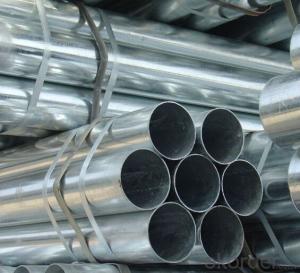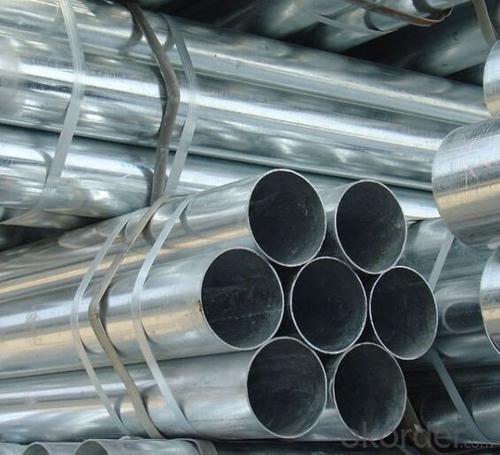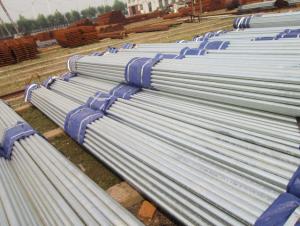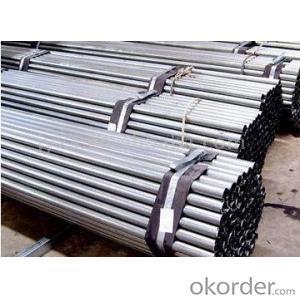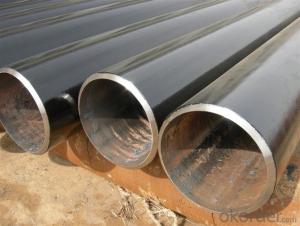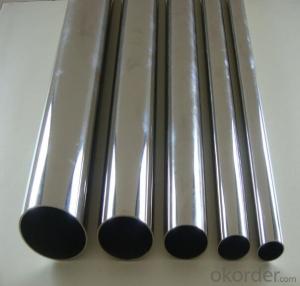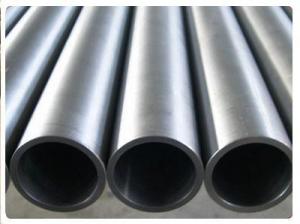Galvanized Seamless Round Pipe Wth Good Price
- Loading Port:
- China main port
- Payment Terms:
- TT or LC
- Min Order Qty:
- 100 m.t.
- Supply Capability:
- 10000 m.t./month
OKorder Service Pledge
OKorder Financial Service
You Might Also Like
1、Structure of Galvanized Seamless Pipe :
Seamless pipe is formed by drawing a solid billet over a piercing rod to create the hollow shell. Since the manufacturing process does not include any welding, seamless pipes are stronger and more reliable.
2、Main Features of the Galvanized Seamless Pipe:
• High manufacturing accuracy
• High strength
• Small inertia resistance
• Strong heat dissipation ability
• Good visual effect
• Reasonable price
3、Galvanized Seamless Pipe Specification:
Standard | GB, DIN, ASTM ASTM A106-2006, ASTM A53-2007 |
Grade | 10#-45#, 16Mn 10#, 20#, 45#, 16Mn |
Thickness | 8 - 33 mm |
Section Shape | Round |
Outer Diameter | 133 - 219 mm |
Place of Origin | Shandong, China (Mainland) |
Secondary Or Not | Non-secondary |
Application | Hydraulic Pipe |
Technique | Cold Drawn |
Certification | API |
Surface Treatment | factory state or painted black |
Special Pipe | API Pipe |
Alloy Or Not | Non-alloy |
Length | 5-12M |
Outer Diameter | 21.3-610mm |
Grade | 20#, 45#, Q345, API J55, API K55, API L80, API N80, API P110, A53B |
Standard | ASME, ASTM |
4、FAQ of Galvanized Seamless Pipe :
①How is the quality of your products?
If you want see our quality certifications and all kinds of testing report, please just ask us for it.
Guaranteed: If products’ quality don’t accord to discription as we give or the promise before you place order, we promise 100% refund.
②How about price?
We quote as lowest as possible for any customer, and discount can be given according to quantity”,if you like bargain and factory price is not low enough as you think, just don’t waste your time.Please trust the quotation we would give you, it is professional one.
③Why should you chose us?
Our service formula: good quality+good price+good service=customer’s trust
SGS test is available, customer inspection before shipping is welcome, third party inspection is no problem.
Any question, pls feel free to contact us !
6、Galvanized Seamless Pipe Images:
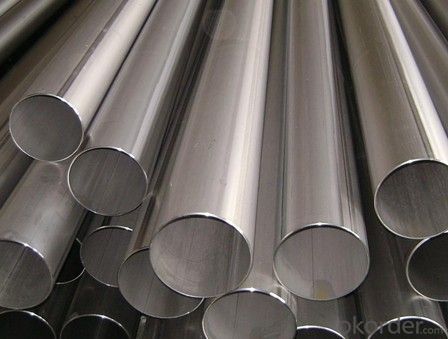
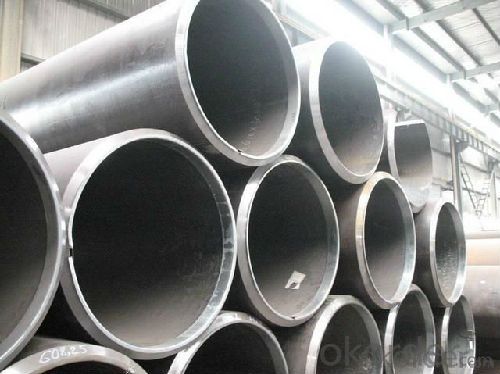
- Q: DN80 seamless steel tube, what is the standard thickness?
- The DN80 specification is 89*6 seamless steel management formula = (outside diameter wall thickness) * wall thickness *0.02466= per meter weight
- Q: How are steel pipes coated for aesthetic purposes?
- There are various ways to coat steel pipes for aesthetic purposes. One commonly used method is to apply a powder coating. This involves spraying a dry powder onto the pipe's surface and then heating it to create a durable and attractive finish. Powder coating offers a wide range of color options and provides a smooth coating. Another method is electroplating, which involves immersing the pipe in a solution containing metal ions and passing an electric current through it. This creates a thin, decorative layer on the surface of the pipe. Electroplating can produce shiny, reflective surfaces or more matte, textured appearances. Painting is also a popular method for coating steel pipes aesthetically. It involves applying liquid paint or enamel to the pipe's surface. By choosing different colors, textures, and finishes, painting allows for a variety of aesthetic possibilities. However, it is crucial to use paint specifically formulated for metal surfaces and capable of withstanding environmental conditions. In addition to these methods, steel pipes can be coated using techniques like hot-dip galvanizing or metal cladding. These processes involve applying a layer of another metal, such as zinc or aluminum, to the pipe's surface. This not only enhances the appearance but also protects against corrosion, extending the pipe's lifespan. Overall, there are multiple methods available for aesthetically coating steel pipes. Each method has its own advantages and should be selected based on the desired appearance, durability, and environmental conditions. Factors like color, texture, finish, and protective properties must be considered to ensure the desired aesthetic result is achieved.
- Q: What is the maximum length of steel pipes available?
- The maximum length of steel pipes available can vary depending on the manufacturer and the specific requirements. However, standard lengths for steel pipes typically range from 18 to 24 feet.
- Q: Are steel pipes resistant to impact?
- Yes, steel pipes are generally resistant to impact due to their high strength and durability. They can withstand external forces and are less likely to deform or break upon impact compared to other materials.
- Q: How do you calculate the flow velocity in a steel pipe?
- In order to determine the flow velocity in a steel pipe, one must take into account the principles of fluid mechanics and apply relevant equations. The Bernoulli equation is the most commonly used equation for this purpose, as it establishes a relationship between the pressure, velocity, and elevation of a fluid. The first step is to ascertain the volumetric flow rate (Q) of the fluid that passes through the pipe. This can be achieved either by measuring the mass flow rate (m) or by directly measuring the volumetric flow rate using a flow meter. Once the volumetric flow rate is obtained, the flow velocity (V) can be calculated. To calculate the flow velocity (V), divide the volumetric flow rate (Q) by the cross-sectional area (A) of the pipe. The cross-sectional area of the pipe can be determined using the formula A = πr^2, where r represents the radius of the pipe. Hence, the formula to calculate the flow velocity (V) in a steel pipe is: V = Q / A It is important to note that this calculation assumes an ideal flow condition and does not take into account any frictional losses or other factors that could impact the flow. In real-world scenarios, it is crucial to consider additional factors such as pipe roughness, fluid viscosity, and pipe diameter to obtain a more accurate estimation of the flow velocity.
- Q: Can steel pipes be used for underground chemical pipelines?
- Yes, steel pipes can be used for underground chemical pipelines. Steel pipes are widely used in various industries, including the chemical industry, due to their durability, strength, and resistance to corrosion. When selecting steel pipes for underground chemical pipelines, it is important to choose the appropriate grade of steel that is resistant to corrosion from the specific chemicals being transported. Additionally, proper coating and lining techniques can further enhance the resistance of steel pipes to chemical corrosion. Regular inspection and maintenance are also necessary to ensure the integrity and safety of the underground chemical pipeline system.
- Q: Seamless steel pipe and welded pipe what is the difference?
- Seamless steel pipe is made of solid round tubes and perforated without gaps. The welded pipe is made of steel or strip after welding and has a slit. Generally seamless pipe can be greater pressure on the city.
- Q: What are the different types of steel pipe valves?
- There are several types of steel pipe valves, including gate valves, globe valves, ball valves, check valves, and butterfly valves. Each type of valve serves a specific purpose and has its own unique features and applications in various industries.
- Q: How are steel pipes used in oil refineries?
- Steel pipes are used in oil refineries for various purposes such as transporting crude oil, refined petroleum products, and other chemicals throughout the facility. They are crucial for the overall infrastructure, including piping networks, storage tanks, and processing units, ensuring efficient and safe fluid flow.
- Q: How are steel pipes protected against corrosion in marine environments?
- Steel pipes are protected against corrosion in marine environments through various methods, including the use of protective coatings, cathodic protection systems, and selecting corrosion-resistant materials.
Send your message to us
Galvanized Seamless Round Pipe Wth Good Price
- Loading Port:
- China main port
- Payment Terms:
- TT or LC
- Min Order Qty:
- 100 m.t.
- Supply Capability:
- 10000 m.t./month
OKorder Service Pledge
OKorder Financial Service
Similar products
Hot products
Hot Searches
Related keywords
